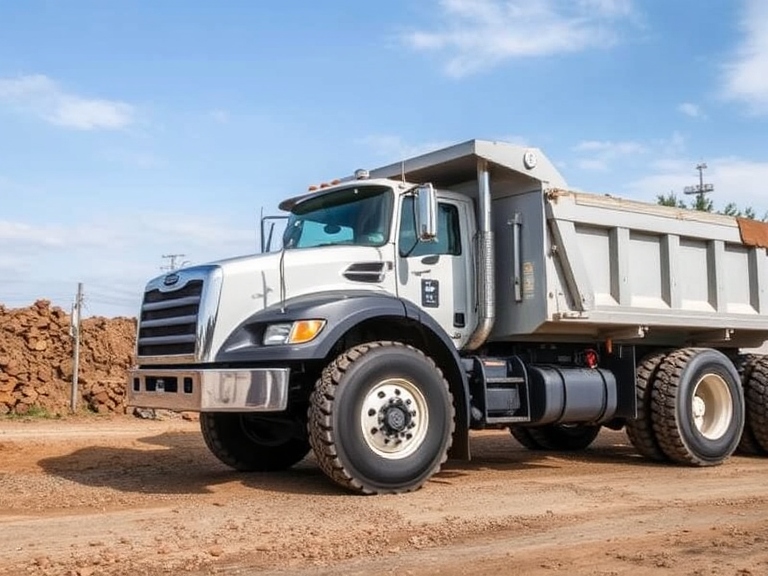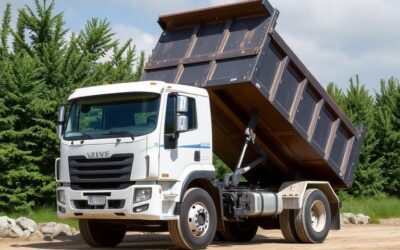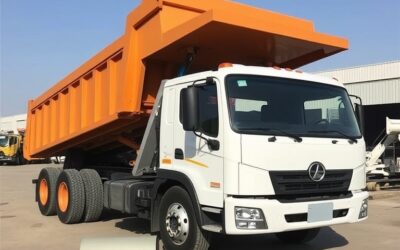Roll-off dump trucks are essential workhorses for heavy loads and waste management. But their high center of gravity and challenging job sites increase the risk of tipping accidents. Following practical safety steps and using technology like Wink Anti Tip can make operations safer and smoother. However, working with these vehicles comes with its own set of risks. Ensuring safety is a top priority to avoid accidents and keep operations running smoothly. Understanding the unique challenges associated with roll off dump trucks helps us implement effective safety measures.
These trucks face several risks, such as tipping, load shifts, and mechanical failures. Roll off dump trucks often operate in challenging environments, including construction sites and uneven terrains. This makes them more prone to accidents if not handled properly. Addressing these risks requires a combination of good practices, regular maintenance, and advanced technology.
To keep everyone safe, it is crucial to follow specific safety procedures. From properly loading and unloading materials to conducting daily inspections, there are many steps we can take to minimize risks. Additionally, incorporating technology like Wink Anti Tip can greatly enhance the stability and safety of roll off dump trucks. By focusing on these areas, we can create a safer work environment and prevent accidents before they happen.
In this article, we will explore the unique risks of roll off dump trucks, key safety measures during loading and unloading, daily inspection tips, and the role of technology in improving safety. With the right approach, we can ensure these vehicles operate safely and efficiently.
Understanding the Unique Risks of Roll Off Dump Trucks
Roll-off dump trucks are indispensable, but their high center of gravity, shifting loads, and uneven terrain make them prone to accidents. Recognizing these risks is the first step toward safer operations. Knowing these risks helps keep operations safe and efficient.
Weight Shifts: When a roll off dump truck moves, its load can shift. This shifting weight can destabilize the truck. For instance, during turns or over rough ground, the load can move and make tipping more likely.
Ground Stability: Roll off dump trucks often operate on uneven or soft ground. This type of terrain can make the truck less stable. If the ground is not firm, the chances of tipping over increase, especially when loading or unloading.
High Center of Gravity: These trucks tend to have a high center of gravity. This height makes them less stable compared to other trucks. Adding a heavy load further raises the center of gravity, increasing the risk of tipping.
Sharp Turns and Stops: Taking sharp turns or making sudden stops can shift the load quickly. This sudden movement makes the truck unstable and more likely to tip over. Drivers must navigate carefully to avoid such dangerous situations.
Loading and Unloading Risks: The process of loading and unloading can also present tipping risks. If the load is not evenly distributed or if the truck bed is raised too high while dumping, the truck can tip. Proper load management is crucial.
By understanding these risks, we can take steps to manage them effectively. Using safety devices like anti tip kits designed for roll off dump trucks can significantly reduce the risk of accidents and enhance safety on the job site.
Key Safety Measures for Loading and Unloading
Loading and unloading roll off dump trucks requires careful planning and attention to detail. Following these safety measures helps prevent tipping and ensures smooth operations.
Even Load Distribution: Spread the load evenly across the truck bed to avoid imbalances and maintain stability. An uneven load raises the risk of tipping. Check the load before moving to ensure it is balanced.
Use Proper Equipment: Use tools like level gauges and scales to ensure balanced and safe loading. For example, use scales to measure load weight and ensure it is within safe limits. Tools like level gauges can help maintain an even distribution.
Level Ground: Always aim to load and unload on level ground. If unavoidable, take extra precautions on uneven terrain. Uneven terrain can make the truck unstable. If the ground is not level, take extra precautions to ensure stability.
Secure the Load: Secure the load with straps, tarps, or nets to prevent shifting during transit. Preventing the load from shifting during transit is crucial for maintaining balance.
Raise Bed Gradually: When unloading, raise the truck bed gradually. Raise the truck bed gradually and monitor stability throughout unloading to prevent sudden shifts., as this can shift the load suddenly and cause the truck to tip. Monitor the truck’s stability throughout the process.
Follow Weight Limits: Never exceed the truck’s weight limits. Overloading puts extra stress on the truck and increases the risk of tipping. Adhere to weight limits to protect the truck’s suspension and maintain safe handling.
Train Operators: Ensure that all operators are properly trained. They should know the correct procedures for loading and unloading to keep the truck stable. Regular training sessions can reinforce these safety practices.
By following these key safety measures, we can minimize risks during the loading and unloading of roll off dump trucks. Proper planning and execution are essential for safe and efficient operations.
Daily Inspection and Maintenance Tips
Daily inspections and maintenance ensure your roll-off dump truck stays safe and reliable. Addressing small issues early prevents costly accidents. These practices catch issues before they become serious problems and help ensure the truck is always in good working order.
Check Tires and Brakes: Check tires for correct inflation and tread. Inspect brakes to ensure quick, reliable stopping power. Uneven or worn tires can affect stability. Make sure the brakes are functioning correctly. Poor brake performance can lead to accidents, especially when carrying heavy loads.
Inspect Hydraulics: Regularly check the hydraulic system, as it controls the lifting and lowering of the truck bed. Inspect hydraulic systems for leaks or worn components to ensure smooth operation during loading and unloading. Ensure the hydraulic fluid is at the proper level.
Examine the Chassis: Inspect the truck’s chassis for any signs of wear or damage. Inspect the chassis and frame for cracks or corrosion. Address damage promptly to maintain structural integrity. Addressing these issues promptly keeps the truck safe and reliable.
Secure Load Mechanisms: Ensure that all load-securing mechanisms, such as straps, tarps, and nets, are in good condition. Replace any that show signs of wear and tear. Test load-securing mechanisms regularly and replace worn straps or nets to ensure safety.
Test Light and Signal Systems: Ensure all lights and signals function correctly to improve visibility on job sites. Proper lighting is crucial for visibility and safety, especially when operating in low-light conditions.
Hydraulic Lifts and Controls: Test the hydraulic lifts and controls to ensure they operate smoothly. Any hesitation or irregular movement needs immediate attention.
Daily inspections help identify potential issues early, keeping the truck in top condition and ensuring safe operations.
The Role of Technology in Enhancing Roll Off Dump Truck Safety
Advanced technology is transforming roll-off dump truck safety, providing real-time monitoring and proactive adjustments. Innovative tools and systems help monitor and maintain stability, reducing the risk of accidents.
Stability Control Systems: Advanced stability control systems monitor the truck’s balance in real-time. Stability control systems monitor balance and automatically adjust loads to prevent tipping or provide warnings to the driver. These systems help prevent tipping incidents.
Driver Assistance Systems: Modern roll off dump trucks can be equipped with driver assistance systems that offer visual and audio alerts. Driver assistance tools provide audio-visual alerts about hazards like sharp turns or uneven ground, such as uneven terrain or sharp turns. Such alerts help drivers take corrective action swiftly.
GPS and Fleet Management: Using GPS and fleet management software, companies can monitor their trucks’ locations and movements. GPS systems help plan safe routes and avoid hazardous areas, enhancing operational efficiency and avoiding areas with known hazards. It also ensures trucks are following the prescribed paths, reducing the chances of tipping.
Load Monitoring Sensors: Sensors can be installed to monitor the weight and distribution of the load. These Sensors actively monitor load balance, alerting drivers to imbalances before they escalate, helping ensure the load remains balanced and within safe limits. They reduce the chances of overloading.
Anti Tip Kits: Specialized anti tip kits, like those from Wink Anti Tip, offer tailored solutions for roll off dump trucks. Anti-tip kits, like Wink Anti Tip, actively prevent tip-overs by detecting instability and adjusting the truck’s balance, such as lowering the unit to regain balance.
Integrating technology into roll off dump trucks enhances safety and operational efficiency, making it a valuable investment for any fleet.
Final Thoughts
Safe roll-off dump truck operations start with understanding the risks and implementing practical steps. From daily inspections to using anti-tip kits, proactive measures make all the difference in preventing accidents and ensuring smooth operations. From daily inspections and maintenance to loading and unloading safely, every step matters in preventing accidents. Technology adds another layer of safety, offering real-time monitoring and corrective actions that greatly reduce the risk of tipping.
The advanced features available—such as stability control systems, driver assistance, and load monitoring sensors—provide significant benefits in maintaining the safety and stability of these trucks. Investing in technology solutions, especially anti tip kits, is a smart decision to protect both drivers and equipment.
For companies looking to enhance the safety of their roll off dump trucks, Wink Anti Tip offers reliable and effective solutions. Our anti tip kits are designed specifically to address the tipping risks associated with these trucks. Stay ahead of potential hazards and ensure smooth, safe operations with our cutting-edge technology.
Take action today to safeguard your fleet. Reach out to Wink Anti Tip to learn more about how our anti tip kits can make a difference in your operations. Ensure the safety of your drivers and maintain the stability of your roll off dump trucks with Wink Anti Tip.





